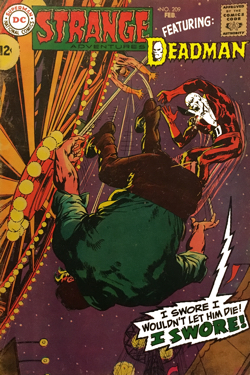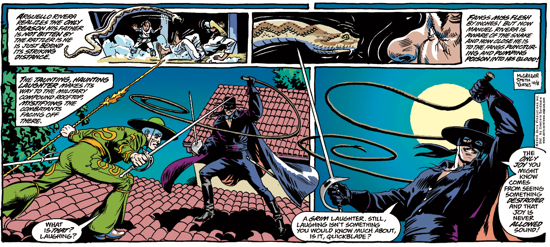Bob Ingersoll: The Law Is A Ass #374
DON’T DO THE TIME, IF YOU DIDN’T DO THE CRIME
The law doesn’t work the way it did in The Twilight Children #1. Except for those times when it does.
Bundo, the town drunk, lives in a small seaside town somewhere in Mexico. According to the local kids who spent two panels giving us Bundo’s back story, Bundo passed out on a couch with a lit cigarette. His house caught fire. His wife and his three little kids died in the fire. Bundo was sent to prison because “mean people said he set that fire on purpose.” Later Bundo was let out of prison when, “they found out he didn’t do it on purpose.”
I don’t know what Bundo was convicted of. My efforts to find out were hampered by the fact that try as I might – and I did try – I couldn’t find any convenient source of Mexican laws online. At least not one I could read. I may have been a Spanish major in college, but that was more than forty years ago. Nowadays my Spanish isn’t even good enough to get me through an episode of Zorro.
Okay, there was this one site where a group of Mexican attorneys offered to provide “English translations of Mexican Laws, Regulations, and Standards.” And all for only $1,275 a year. I passed. It’s not that I don’t love you, my readers. I do. I just don’t love you that much. (Apparently, you can put a price on love and it’s $1,275 a year.)
So, I’m going to analyze Bundo’s situation using law I can find and research; Ohio law. My Yahoo weather app assigns random pictures from Flickr to the background screen for my home town’s weather. According to Yahoo, Cleveland has mountains, hot springs, icebergs, and castles in it. I see no reason why it can’t have a small Mexican seaside village as well.
One of the few things I did learn about criminal trials in Mexico is that they’re tried to judges, not to juries. If the judge in our strange hybrid world of MexicOhio believed Bundo did what he did on purpose, that judge would have convicted Bundo of aggravated murder.
The judge might have thought Bundo murdered his wife and children with prior calculation and design. That’s what we used to call “premeditated murder” back in those unenlightened days when we let Perry Mason define our crimes and not legislators who were paid by the word. If so, the judge would have convicted Bundo of aggravated murder with prior calculation and design.
Bundo’s children were described as “little kids.” They were probably under the age of 13. In MexicOhio, aggravated murder also lies if someone purposefully kills a person of tender years.
Finally, if the judge believed that Bundo set his house on fire on purpose that would be aggravated arson. As Bundo’s wife and children died as a result of the aggravated arson, the judge could have convicted Bundo of aggravated murder under a felony murder rationale.
It doesn’t matter under what theory the judge convicted Bundo. He could even have mixed and matched theories like socks in a Laundromat. What matters is that Bundo would have been convicted of aggravated murder.
Aggravated murder is a hefty crime. It’s not surprising then that it carries a hefty prison sentence. Not the death penalty – Mexico doesn’t have the death penalty – but a long, long sentence.
In the story, Bundo was released from prison after “they”determined he didn’t kill his family “on purpose.” In the real world – or even the semi-real world of MexicOhio – Bundo would not have been released just because, “they found out he didn’t do it on purpose.”
Ohio courts have the power to modify convictions if new facts come to light. Juries can consider lesser included offenses. So can courts. If new facts prompt a court to conclude the evidence no longer supports a conviction for one crime, the court can determine whether the evidence is sufficient to support a conviction any lesser included offense subsumed in the greater crime.
Bundo was so drunk that he passed out on the couch with a lit cigarette. Said cigarette started a fire which killed his wife and children. It’s my considered opinion that any judge who considered Bundo’s case would correctly find that even if Bundo didn’t do it on purpose, so wasn’t guilty of aggravated murder, he was guilty of reckless homicide.
After the judge found Bundo guilty of reckless homicide, it would have imposed a new Bundo, one appropriate for reckless homicide. Bundo wouldn’t have been released simply because “they,” whoever “they” were, suddenly discovered that he didn’t kill his family on purpose. He would have gone back to prison under the new sentence imposed on him. That’s why the law doesn’t work the way it did in The Twilight Children # 1.
But here’s why it sometimes does.
The judge might think the years Bundo had already spent in prison for the aggravated murder which he didn’t really commit was sufficient punishment for the reckless homicide which Bundo did commit. In that case, the judge could suspend the new sentence he imposed on Bundo for reckless homicide and put Bundo on probation.
Also we don’t know how long Bundo had been in prison before he was released. If Bundo had spent so much time in prison under his sentence for aggravated murder that he had already served the maximum sentence authorized by law for reckless homicide, what then? Due Process says you can’t imprison a person for longer than the maximum sentence authorized by law. In that case, the judge would have released Bundo, because he had already served the maximum sentence. Either way, Bundo would have been released from prison because “they found out he didn’t do it on purpose,” just like the story said.
And that’s why the law doesn’t work the way it did in The Twilight Children # 1, except for those times when it does. Under either scenario, Bundo would be free from prison and free to contemplate the mysteries of life.
Mysteries such as this. Bundo is a slang term meaning to become highly intoxicated. Why the hell would his parents give him a name that was basically a self-fulfilling prophecy? Parents who do that – especially comic book parents who do that – are a real E. Nigma.















Mr. Ingersoll
Great column as always. But I have a quick question. One Sunday recently, the Hallmark Movie Channel was having a “Columbo” marathon. (I’m from Detroit. What am I going to do on Sunday afternoon, watch the Lions?) I hadn’t seen a Columbo in years, so I sat down and watched what was on. It was great. I watched the next one. Ended up seeing like four in a row.
Like a drug addict, I had fallen off the wagon and was hooked on Columbo. Decided to cruise the Net and see what others wrote, and came across your column about the one with Fisher Stevens. You wrote how Columbo had committed an illegal search by looking around the movie director’s boy cave without permission and finding evidence.
Question. If Columbo had said “I’d like to have an ice cream soda in your man cave and explore the space to see how a movie genius like you spends is spare time?” and Stevens said yes. Would that have counted as permission? Would that have stood up in court?
Thanks
Probably not, because Columbo would have obtained permission to search under false pretenses. If Stephen Spielberg — Okay I know Fisher Stevens’s character wasn’t named Stephen Spielberg, but we all knew who he was — had known the real reason Columbo wanted to look around, he probably would have said no. Permission obtained by lying about the underlying reason for the permission is not an informed consent.
Cool. Good to know. Great idea . You write a series of columns here you rate the legal strength of Columbo’s cases.
You do all the hard work, and I take credit.
I can live with that.
Thanks for the quick answer.